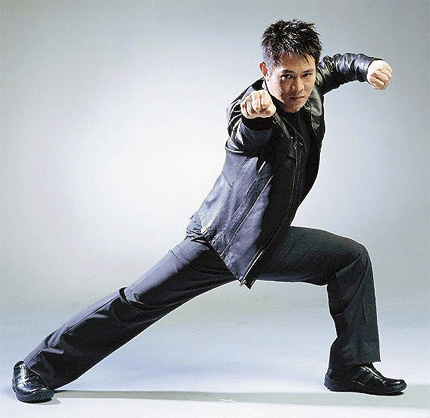Film hero is reborn -- Jet Li on a new mission
Li Lianjie refuses to strike a kung fu pose for photographers. "I don't like violence at all," said the action movie star better known to English-speaking audiences as Jet Li.
The devout Buddhist has had an epiphany -- film making is now just a hobby, and philanthropy is his career and life.
The turning point was in 2004, when Li and his family, holidaying in the Maldives, were caught in the devastating Indian Ocean tsunami.
"It's not like in the movies. The water just rose so fast. I picked up my four-year-old daughter Jane and the baby-sitter got Jada, and we ran to the hotel (from the beach). The water was up to my waist, and a second later, it was up to my chest."
|
|
|
Though Jet Li is most famous for his kung fu movies, he says he doesn't like violence at all and now wants people to focus on his charity foundation. [Shanghai Daily] |
The experience made him realize the insignificance of his skills and achievements in the face of nature's power.
"All the money and power in the world cannot save you from the waves. I had to do something," Li said. It was the culmination of seven years of studying Buddhist doctrine and traveling the world looking for a meaning to his life.
After talking with his wife, former Hong Kong actress Nina Li Chi, he donated HK$500,000 (US$64,342) to tsunami-affected people in a charity show with celebrities in Hong Kong and put another HK$500,000 into setting up a charitable foundation.
The One Foundation, formally established in 2007, is based on the notion that if each person donates at least 1 yuan (14 US cents) a month, the donations can be transformed into a much greater fund, Li said.
"I want to spread the idea that not only millionaires, celebrities and leaders, but each individual shares the responsibility to help others. We just need to offer help within our abilities," he said.
More than a million volunteers have since registered on the One Foundation Website, donating their money or time.
Disaster relief is one of its main causes and it gave 78 million yuan for relief and reconstruction after the May 12 earthquake in southwest China, in 2008.
It plans to train a professional fast-response relief team of 400 volunteers to help official relief organizations.
Li uses every opportunity to talk about the foundation, but its very concept has prompted many to ask exactly how much Li himself contributes. The answer is a private matter, he always responds. "Donation competition is not part of the One Foundation's concept."
He has another aim for the foundation, which also breaks new ground in Chinese concepts of charity: he wants to make it an enterprise, aimed at the social good, that is financially self-sustainable.
In a trial project, Qiang ethnic women in the quake zone were trained in traditional embroidery skills and helped to sell their products. From a 4-million-yuan investment has come a profit of 10 million yuan, plus jobs for 7,000 women, whose monthly incomes have risen from 300 yuan before the quake to 700 yuan.
But the foundation is reluctant to take out the profit as the public will ask: "How could you make money from quake survivors?" he said. "Chinese people jump to moral judgements."
He knows the charity must be properly managed as a corporation. The foundation has invited audits by accounting firms Deloitte and KPMG and quarterly progress reports are issued to let the public know where every yuan goes.
His "Philanthropy Awards" are setting new standards for charities in China and helping international donors find suitable organizations for cooperation.
"We want a platform for the better development of domestic non-governmental organizations," Li said.
"Credibility, professionalism, execution and sustainability" are listed as the award standards, and experts, journalists, consultants, legal and financial professionals are invited to vote.
 0
0 








Go to Forum >>0 Comments